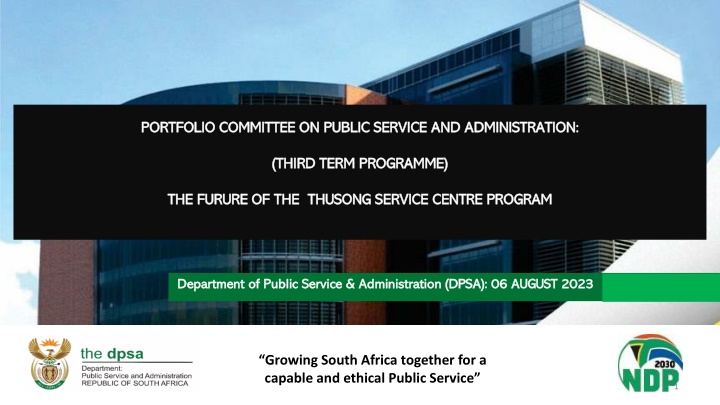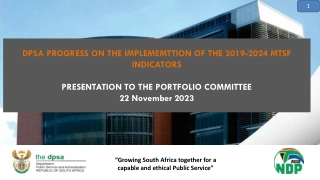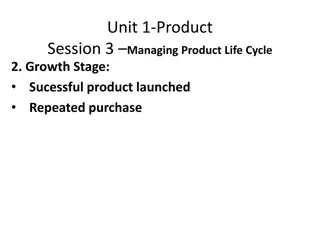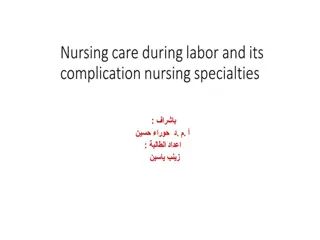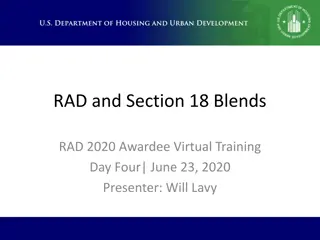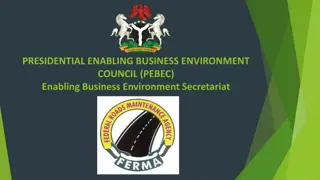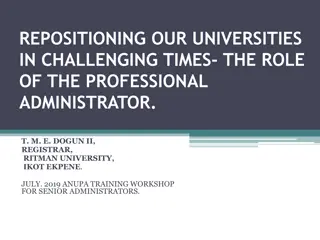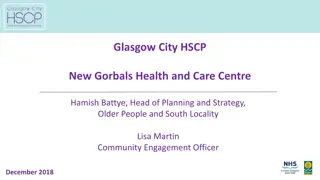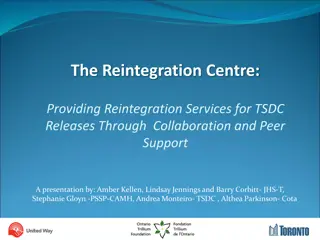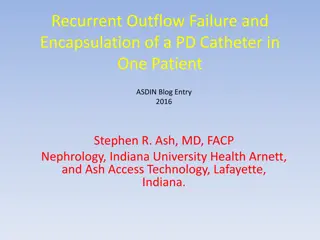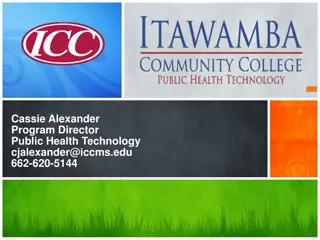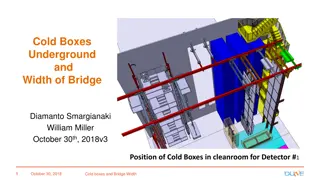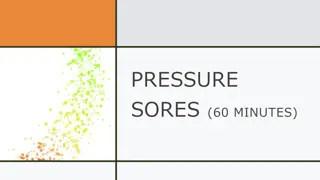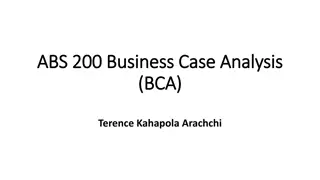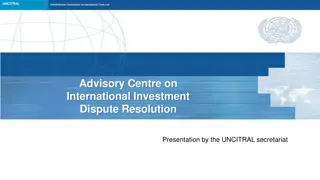Repositioning the Thusong Service Centre Program for a Capable Public Service
The Thusong Service Centre Program, established in 1999, aims to expand access to information and services for citizens. However, challenges such as lack of coordination, funding, and changing demographics hinder its optimal functionality. The Department of Public Service & Administration plays a crucial role in policy and regulation to address these challenges and ensure a capable and ethical public service. Repositioning the program involves addressing these implementation obstacles and leveraging best practices to enhance service delivery and governance.
Download Presentation

Please find below an Image/Link to download the presentation.
The content on the website is provided AS IS for your information and personal use only. It may not be sold, licensed, or shared on other websites without obtaining consent from the author.If you encounter any issues during the download, it is possible that the publisher has removed the file from their server.
You are allowed to download the files provided on this website for personal or commercial use, subject to the condition that they are used lawfully. All files are the property of their respective owners.
The content on the website is provided AS IS for your information and personal use only. It may not be sold, licensed, or shared on other websites without obtaining consent from the author.
E N D
Presentation Transcript
PORTFOLIO COMMITTEE ON PUBLIC PORTFOLIO COMMITTEE ON PUBLIC SERVICE AND ADMINISTRATION: SERVICE AND ADMINISTRATION: (THIRD TERM PROGRAMME) (THIRD TERM PROGRAMME) THE FURURE OF THE THUSONG SERVICE CENTRE PROGRAM THE FURURE OF THE THUSONG SERVICE CENTRE PROGRAM Department of Public Service & Administration (DPSA): 06 AUGUST 2023 Department of Public Service & Administration (DPSA): 06 AUGUST 2023 Growing South Africa together for a capable and ethical Public Service 1
CONTENT CONTENT Background Implementation challenges Repositioning of the Thusong Service Centre Program Benchmarking on best practices The Future of the Thusong Service Centre Program Urban Model Thusong Service Centres Conclusion Growing South Africa together for a capable and ethical Public Service SECRET 2
BACKGROUND BACKGROUND Thusong Service Centre Program (the Program) was established in 1999 by Cabinet with its main objective being to expand access to information and services in an integrated and sustainable way. Aim was to provide access to development communication, quality services and opportunities closer to where the citizen lives. Program was initially designed to foster cooperation between departments to improve service access Focus was on under-service areas, it has since included Urban Model pilot at Maponya Mall in 2011. GCIS was mandated with the coordination function of the program, which ensured that various structures were established to strengthen management and governance of the Centres. SITA was given the responsibilities to connect the TSCs. The 6 Administration s national reconfiguration of the State, migrated SITA from the DPSA to the DCDT Growing South Africa together for a capable and ethical Public Service SECRET 3
IMPLEMENTATION CHALLENGES IMPLEMENTATION CHALLENGES Generic challenges facing the optimal functionality and sustainability of the TSCs include among others: No national lead department to coordinate the Program. Lack of legislative prescript for collective services by government leading to unstructured coordination system. It is located and coordinated between Office of the Premiers and COGTA across provinces. Lack of dedicated funding whereby the TSC Program does not have a workable funding model. Changes in external environment, the requirements of NDP and previous reviews and oversight of Thusong Program have identified and highlighted numerous institutional & operational challenges. Increased demand for services within context of current financial constraints. Changing demographics, migration and settlement patterns. Evolving service delivery models of departments requiring the need to diversify and modernise Growing South Africa together for a capable and ethical Public Service SECRET 4
THE ROLE OF THE DPSA THE ROLE OF THE DPSA The DPSA is responsible for Policy and Regulatory functions as required for in terms of the Public Administration Management Act, 2014. In terms of Section 18(1), the Minister may make regulations regarding (b) a framework for the establishment, promotion, and maintenance of service centres to enhance service delivery of services to the public. Furthermore, the DPSA authority is provided for in terms of the Public Service Act, 1998, Section 3(1) provides that , the Minister is responsible for establishing norms and standards relating to- (i) transformation, reform, innovation, and any other matter to improve the effectiveness and efficiency of the public service and its service delivery to the public. Growing South Africa together for a capable and ethical Public Service SECRET 5
REPOSITIONING OF THE TSC PROGRAM REPOSITIONING OF THE TSC PROGRAM An Inter-departmental Steering Committee made up of the DPSA; GCIS; NT, DCoG, DPWI, DPME was tasked with the responsibility of contributing towards the repositioning of the TSC Program during the 2014-2019 MTSF period. Numerous critical projects were concluded, including:- Developing a business case on suitable options on governance arrangements, Overall coordination and location across the three spheres and Possible viable funding model aimed at ensuring optimal functionality and sustainability Growing South Africa together for a capable and ethical Public Service SECRET 6
REPOSITIONING OF THE TSC PROGRAM REPOSITIONING OF THE TSC PROGRAM The Repositioning of the Program to be underpinned by the following: National Co-ordination function of the TSCs be situated within a department or institution with a footprint at local authorities. Setting norms and standards for maximum distance to be travelled by citizens and minimum norms and standards for service delivery. Usage of Geographic Information Systems (GIS) to develop service delivery spatial maps to be used for aligning services and ensuring that service access points are spatially logical. Development of a funding model under the guidance of the National Treasury, DPSA, GCIS. Promoting Thusong Centres as platforms of direct interactive communication closer to the people. Documenting and capturing of experiences and lessons learnt and development of an establishment and management blueprint for the Centres to ensure standardisation. Growing South Africa together for a capable and ethical Public Service SECRET 7
BENCHMARKING ON BEST PRACTICES BENCHMARKING ON BEST PRACTICES Benchmarking on best practices highlighted the following critical considerations for optimal functionality: Longer-term funding are essential to enable appropriate institutional arrangements, collaborative processes, establishment of procedures and protocols, monitoring, and reporting. Government-wide, institutional context founded on legislation to provide guidance in terms of accountability and oversight, operations, resourcing and overall management and implementation. Allocation of the Program to a national lead department co-ordinate, manage and report on the Program. Strengthened intergovernmental relations using the Intergovernmental Relations Framework Act as a basis to enhance and improve co-ordination and co-operation within the Centres. Growing South Africa together for a capable and ethical Public Service SECRET 8
BENCHMARKING ON BEST PRACTICES BENCHMARKING ON BEST PRACTICES An integrated service delivery model for the Centres should be supported by a strong ICT infrastructure, and systems which are inter-linked, aligned, and able to share information across departments. Location of a Centres should be decided through an in-depth study undertaken to determine the community needs; sufficient footprint; the geographic spread and demand for services. Need to formalize contracted relationships and responsibilities through the Memorandum of Agreements establishing an understanding of roles, responsibilities and relationships in managing the Centre. Organisational culture that envisions creating a developmental citizen-centric public service guided by the ethos of Batho Pele. Growing South Africa together for a capable and ethical Public Service SECRET 9
THE FUTURE OF THUSONG SERVICE CENTRES THE FUTURE OF THUSONG SERVICE CENTRES Empowered by PAMA, 2014, DPSA finalised the Framework for Service Centres and the Framework for Thusong Service Centres. Both instruments are at the consultation stage. Amongst others, these Frameworks seeks to provide for future Thusong Centres focusing on the following: Need for dedicated national Lead Responsive Funding Model. Governance Structures Service Delivery Model Monitoring and Evaluation Strengthened Complaints and Compliment systems Reporting Growing South Africa together for a capable and ethical Public Service SECRET 10
URBAN MODEL THUSONG CENTRE URBAN MODEL THUSONG CENTRE DPSA was mandated by Cabinet to pilot a One-Stop-Shop of government in 2008 (Maponya Thusong Service Centre) The centre is made of the following Departments:-Gauteng Dept of Transport, Dept of Employment & Labour, Department of Home Affairs, Gauteng Job Centre, NYDA and Gauteng Enterprise Propeller Various studies were conducted around the Urban Mall Concepts focussing on the Institutional Blueprint for the establishment, Management & Monitoring of Urban Centres. The centre has served as a Best-Practice Model for other countries around the continent for countries such as Kenya, Botswana and Namibia. Growing South Africa together for a capable and ethical Public Service SECRET 11
URBAN MODEL THUSONG CENTRE URBAN MODEL THUSONG CENTRE The centre is the only one with a Queue Management System in the country to demonstrate service request and demand by citizens to enable continuously improvement to delivery of services. A Lessons Learned Report anda Citizens Satisfaction Survey were developed to measure the impact that the centre has on the communities within Soweto and surrounding areas. Discussions are currently under-way to Transfer the centre to a relevant department in Gauteng through the office of the Premier. Growing South Africa together for a capable and ethical Public Service SECRET 12
CONCLUSION CONCLUSION The Committee to note the work undertaken to date regarding the Thusong Service Centres. The Program should have a Lead Department that oversees the management and execution of service delivery for the betterment of communities. Growing South Africa together for a capable and ethical Public Service SECRET 13
